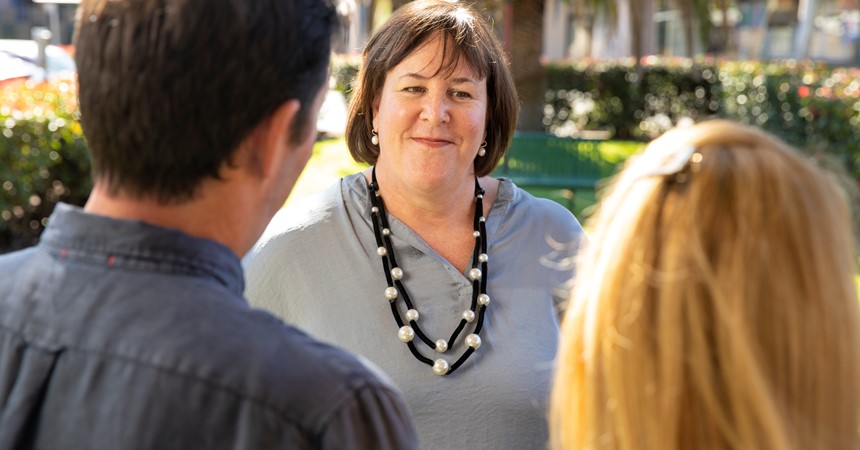Testimonies from young women have created momentum on a whole-of-society issue that requires a co-ordinated response across government and the community.
In NSW, all three education sectors signed a Statement of Intent as a first step to driving cultural change around sexual violence. Catholic, government and independent schools agreed to strengthen the understanding of consent and harm prevention in school communities.
Catherine Garrett-Jones is the Professional Officer (Family Engagement) for the Diocese of Maitland-Newcastle Catholic Schools Office. Mrs Garrett-Jones says Catholic schools recognise families as the first educators of their children.
“It goes without saying that parents and carers have the primary responsibility in shaping the values and attitudes of their children,” she says.
“The Statement of Intent is a shared commitment that recognises the rights of children and young people to feel safe, protected and valued and to be given the opportunity or voice to strengthen and inform further work that needs to be done to support the development of healthy relationships and prevent harmful situations.”
Zoë Trypas is Senior Investigator, Prevention and Response Service, for the Diocese’s Office of Safeguarding. Ms Trypas says students, parents, communities, and statutory oversights expect schools to be safe.
“To be fair, schools’ responsibilities in this day and age are many and varied and ever-increasing,” she says. “Not only do schools have legal and moral obligations to prepare for and respond to safeguarding matters within their functioning, there is now a trend for schools to be brought into safeguarding concerns that occur outside their limits but impact on students within their community.
“Student peer-on-peer sexual incidents are a good example of this. An alleged sexual crime or abuse occurs between students on the weekend at a private party and on Monday morning the school finds itself needing to respond to a dynamic of often competing priorities. These include ensuring appropriate safeguards for the students involved whilst maintaining their educational needs, providing supports to the students and their families, and working co-operatively with any statutory authorities that may be involved. It’s a lot for schools to be solely responsible for.”
Statistics show our teenagers are finding themselves in front of the law. The Australian Institute of Health and Welfare’s report “Sexual Assault in Australia” says in 2018–19 the majority of sexual assault offenders recorded by police were male (97 per cent) with boys and men aged 15–19 incurring the highest offender rates of any age group.
Disrespect and violence towards women are nothing new, but today’s young men vilified for toxic masculinity have grown up in an era of pornographisation. The internet is seemingly beyond censorship.
In reflecting on her own experience as a parent, Mrs Garrett-Jones said she and her husband have tried to instil values that ensure their daughters are not only capable of making appropriate, healthy decisions for themselves, but can voice concerns for vulnerable peers.
“Our role as parents has been to model the respectful relationship we hope our children will experience,” she says. “But more importantly, to guide them to the support they may need, to encourage conversation that enables them to share their experiences and gain confidence in their own value system.
“This has not just ‘happened’. It has been a life-long experience for them, centred in our family, often around the dinner table where no topic is off limits. Sexual consent has been on our ‘dinner-table agenda’, with uniform belief that a cultural shift is required and parents and carers – the grown-ups in the lives of young people – have a critical role in ensuring attitudes that may stem from entitlement and privilege, are challenged and confronted.
“As parents and carers, we have the ultimate privilege of shaping values that ultimately result in young people positively impacting the fabric and culture of our communities.”
Australian Bureau of Statistics figures highlight that sexual assaults of people aged 15 and over most frequently involve an offender known to the victim. Ms Trypas says this is not unique to the era.
“Entitlement, boundary breaches, and the general acceptance of unwanted behaviour have been long tolerated in our communities, generation after generation,” Ms Trypas says. “But current statistics highlight the fact that our young boys and men are the most vulnerable in repeating the harmful sexual behaviours they’ve absorbed along the way and they’re more likely to do this with people they know.”
A focus shift is required from educating girls about minimising risk of sexual harm to instructing boys on their legal and moral obligations. The aim should be virtuous masculinity.
Consent:
- is not only about obtaining a single “yes” or “no”
- is an agreement between people to engage in a sexual activity
- is needed for any kind of sexual activity, non-physical and physical
- means freely choosing to say “yes” to a sexual activity
- is always clearly communicated – there should be no mystery or doubt, impairment, coercion, or aggravation.
New definitions refer to “enthusiastic/affirmative” consent. If it is not an enthusiastic “yes”, then it is a “no”.
Persistent “gentle” coercion leading to a reluctant “OK” is no longer acceptable consent.
Multiple indications of consent can occur in any one sexual activity.
Consent can be withdrawn at any point in the sexual activity.
Without consent, any sexual activity is against the law and can be harmful.
Each individual has the right to decide what happens to their body irrespective of age, gender, culture, personal characteristics, behaviour, attitude, clothing, state of intoxication or other form of impairment.
This information comes from the following sources:
Reach Out www.au.reachout.com
Family Planning NSW www.fpnsw.org.au
Rape and Sexual Assault Research and Advocacy www.rasara.org

























































































